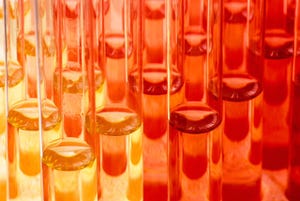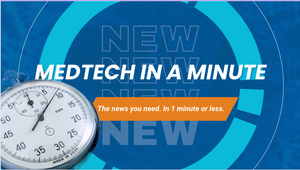Implant Sponsor “Disappointed” by Guidance Document
Originally Published MDDI March 2004NEWSTRENDS
March 1, 2004
Originally Published MDDI March 2004
NEWSTRENDS
|
Dan Cohen, vice president of Inamed's global government relations, wants clarification. |
John Conroy
Expressing disappointment with FDA's latest guidance document, a major manufacturer of silicone-filled breast implants said it has been consulting regularly with the agency to determine how to meet the new guidelines.
Inamed Corp., the healthcare company based in Santa Barbara, CA, disputes FDA's claim that the document more clearly defines recommendations for breast implant marketing applications. When he announced the release of the guidelines on January 8, Mark B. McClellan, MD, PhD, FDA commissioner, said the agency seeks “to provide a clear, scientifically appropriate, and up-to-date pathway for demonstrating safety and effectiveness.” The commissioner also said the new recommendations are needed to “provide a reasonable assurance of safety” so that women and physicians can “make informed decisions about silicone implants.” The document supersedes FDA's previous guidance for PMA applications published in February 2003.
However, Inamed isn't so sure the document's new recommendations are as clear as FDA said. “There's no question we're disappointed by the decision itself,” said Dan Cohen, Inamed's vice president of global government relations.
The problem is twofold, he said. “Looking at this document, we don't know at this point when we've satisfied the more requirement. We're sitting down with them on a regular basis. We say, ‘We think you mean x, and we believe the way to accomplish x is by doing the following one, two, three things.' Our challenge is to get some clarification from them.
“The other part of the problem is that FDA in many cases isn't sure what they mean by more,” the executive added. “I don't want to put it into the negative, but by not saying what more means, it's all a little tautological.”
After Inamed submitted a PMA for silicone breast gel implants, the company received a deficiency letter. Since receiving the letter, Inamed has tried to “put together a process” that will satisfy FDA requirements for marketing the implants, Cohen said. In October 2003 the sponsor offered to take specific action based on comments it had received from the panel.
Cohen emphasized there is no outright ban on silicone implants. “There is a voluntary moratorium on the sale of silicone to the general public. Silicone is available for women seeking reconstruction after a mastectomy or for women who have previously had silicone implants or need replacements. Or, if there are some very specific criteria, [the implants] are available.” At the moment they cannot be used for breast augmentation, however.
Inamed markets silicone-filled implants under the McGhan and CUI brand names. “Our petition was to prove the efficacy of our silicone implants for general sales. We would like to have seen more in the guidance document,” Cohen said.
The new recommendations cover mechanical testing, modes and causes of rupture, clinical study information, postapproval requirements, and labeling. Ruptures are one of FDA's major concerns. Cohen said Inamed has a mode testing method to address this issue. “We say we think that by doing the following items, these tests will get you the information you were seeking, and we all will have a better understanding of why implants rupture.”
However, he added, the company will continue to work with FDA to get a clear guidance. If FDA does not like Inamed's solution, he said, the company will be willing to say, “We proposed [solution] A, and you say that won't work? Well, what will work for you?'”
Cohen said Inamed and Mentor Corp., another Santa Barbara–based manufacturer of silicone-gel implants, have an approximately 50-50 split of the U.S. breast implant market. In December 2003, Mentor filed the clinical module of its PMA application for silicone gel–filled breast implants.
Asked to comment on the new guidelines, Mentor's Vicky Johnson, assistant to the company's chief executive, told MD&DI that the company had no comment beyond a press release posted January 9 on its Web site. In the release, Chris Conway, CEO, said Mentor was not surprised that FDA issued the revision asking for more information. “We were pleased with the information and data that we submitted in our PMA application, and confident that it satisfied the requirements of the previous guidance document,” he said. “However, the new requirements as outlined in the revised guidelines will require more information. Some of this information will take time to acquire and analyze for submission.
“We remain confident that the scientific data support the safety and efficacy of our products, and we believe that our silicone-gel breast implants will eventually receive FDA approval for marketing.”
Attempts to contact Poly Implants Prostheses (PIP), a French manufacturer of silicone-gel implants, were unsuccessful. Based in La Seyne-sur-Mer, the company is the third largest supplier of breast implants in the world. It recently developed titanium-coated implants, which PIP claims are more biocompatible than uncoated counterparts.
Inamed recently received some good news from Europe about its implants. The company was awarded Class III CE mark approval and recertification for all breast implants distributed in the European Union. Cohen said the ruling probably will have minimal impact on its interactions with FDA. “In some ways, it doesn't have any direct impact. There may be some tangential effect.”
The recertification came in large part because of the effects of European unification and the fact that “different countries have different standards.” As a result, “they harmonized standards and put us in the most restrictive class.” He said Inamed's due diligence efforts in Europe occurred within the same time frame that FDA was reviewing its application in the United States.
“The guidance document isn't a regulation with specific endpoints and bright lines,” Cohen said. Nevertheless, the company executive is confident that Inamed will receive the clarification it seeks and eventually satisfy the agency's requirements. “We have met with senior levels at the FDA, and we're given every confidence and assurance they want to help us to get this PMA into an approvable form.”
Copyright ©2004 Medical Device & Diagnostic Industry
About the Author(s)
You May Also Like



